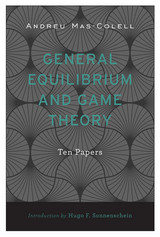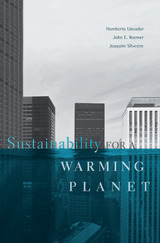
Andreu Mas-Colell revolutionized our understanding of competitive markets, price formation, and the behavior of market participants. General Equilibrium and Game Theory offers readers a compendium of his most important scholarly contributions, gathering in a single volume the groundbreaking papers that have solidified his standing as one of the preeminent economic theorists of our time.
Built upon the foundations of neoclassical economics, Mas-Colell’s work is distinguished by a mathematical and analytical elegance that brings theory closer to real-world situations. He overturns the standard assumption of general equilibrium theory—that markets are perfectly competitive and their participants are perfectly rational—and concludes that neither the law of supply and demand nor the existence of equilibrium prices depends on the rationality of agents. Similarly, Mas-Colell (working with Sergiu Hart) challenges classical game theory’s reliance on rational behavior, demonstrating that adaptation and learning shape the dynamics of repeated games.
Addressing central questions of finance, trade, industrial organization, and welfare economics, Mas-Colell shows the surprising power and versatility of differentiability and linear-space mathematical techniques, and he emphasizes the fruitfulness of cooperative game-theory approaches, such as Shapley value theory and the Bargaining Set, for understanding competition and distribution. General Equilibrium and Game Theory is a signal contribution to economic theory and an invaluable resource for anyone wishing to study the craft of a master of economic modeling.

Human-generated greenhouse gas emissions imperil a global resource: a biosphere capable of supporting life as we know it. What is the fair way to share this scarce resource across present and future generations, and across regions of the world? This study offers a new perspective based on the guiding ethics of sustainability and egalitarianism.
Sustainability is understood as a pattern of economic activity over time that sustains a given rate of growth of human welfare indefinitely. To achieve this, the atmospheric concentration of carbon must be capped at some level not much higher than exists today, and investments in education and research should be higher than they currently are. International cooperation between developing and developed nations is also vital, because economic growth and the climate problem are intertwined.
The authors propose that the guiding principle of bargaining should be that the dates at which developing countries’ living standards catch up with those of developed countries should not be altered by the agreement. They conclude that developed economies would have to agree not to exceed 1 percent growth in per capita GDP annually, while developing nations should grow at a faster rate, but still lower than current projections, until they converge. The authors acknowledge that achieving such a dramatic slowdown would carry political and economic challenges.
READERS
Browse our collection.
PUBLISHERS
See BiblioVault's publisher services.
STUDENT SERVICES
Files for college accessibility offices.
UChicago Accessibility Resources
home | accessibility | search | about | contact us
BiblioVault ® 2001 - 2024
The University of Chicago Press









